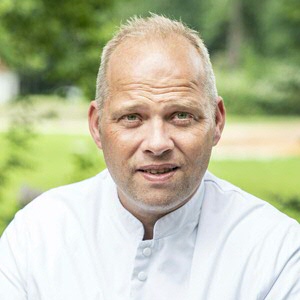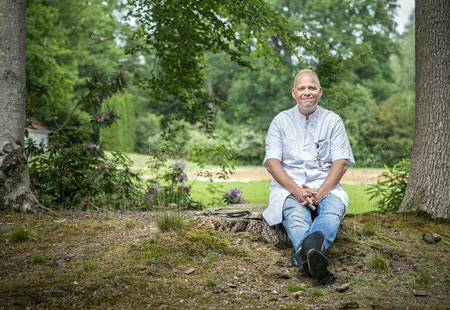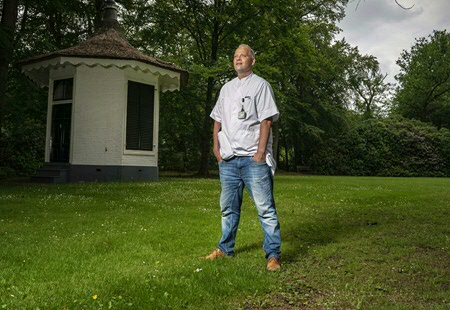‘Everyone has their own ideas about a good death’

Sander de Hosson believes that dying is precision work, and that everyone has their own ideas about what a good way to go is. So, he was puzzled to discover that the end of life was a subject rarely discussed in lecture halls and consultation rooms, both during and after his degree programme. De Hosson developed into veritable ambassador for palliative care. He has recently been elected as Alumnus of the Year 2019. The UG sees this as an opportunity to honour the entire medical profession.
When I called lung specialist Sander de Hosson, all but one coronavirus patients had been discharged from the intensive care unit of Wilhelmina Hospital in Assen. It was the end of May and things were starting to get back to normal in the hospital. The pulmonary department was resuming the chemotherapy and immunotherapy that had been postponed to make way for patients with COVID-19. But things could have been a lot worse in Assen. De Hosson thinks that they admitted around twenty people, most of them from Brabant. This doesn’t mean that the coronavirus pandemic has not affected the lung specialist. He was shocked by the severity of the illness and by people dying alone, only able to see their loved ones via Facetime. ‘Horrific’, is how De Hosson describes it. There was no choice; COVID-19 was an unpredictable enemy. But the strict protocols were the diametric opposite of De Hosson’s view that as death approaches, rules and regulations should be cast to the wind. He prefers to observe the human measure. In fact, De Hosson once picked up the phone himself to implore the authorities to let a terminal nursing home resident die at home. And he once deployed his considerable network to ensure that a young cancer patient could get married on the day before he died.

Moving stories
While training to be a specialist at the Martini Hospital in Groningen, De Hosson and internist-oncologist Sabine Netters wrote a textbook entitled Probleemgeoriënteerd denken in de palliatieve zorg [Problem-oriented thinking in palliative care] (2011). Netters and De Hosson also initiated a symposium on medical ethics for specialists and GPs. The symposium still exists. ‘We both felt very strongly that palliative care had become the weakest link.’ The subject became his chosen cause. ‘I noticed that I could make a difference as a writer, that I could help people to take more control of what happens when they die. I’d already written about the theory, but I wanted to highlight the emotional side.’ A whole series of moving stories flowed from his pen, all based on his own experience with patients during the final stages of their lives. The stories were published in the Dagblad van het Noorden and the Leeuwarder Courant newspapers, and later, after he had added a few new stories, they were compiled into a well-received anthology entitled Slotcouplet. In the book, which was published in 2018 and is now awaiting its twelfth print, De Hosson presses for doctors to be taught more about dying during their training. ‘It’s something I missed during my own training, both while specializing and during my basic training.’
Treatment mode reflex
The technical side of disease always takes priority. ‘The doctors I came across never really discussed death. Their treatment mode reflex bothered me. Everything revolved around the treatment options, with no consideration for whether this would actually benefit the patient. Which sacrifices must someone make to live three months longer? What are the side-effects of treatment? Will they have to keep coming to hospital during those precious last months? To my mind, this is something people should think about very carefully.’ Even patients were scared to broach the subject of their own imminent death. ‘They’re the first questions people have after “Doctor, how long have I got?” What is death like? What happens? Will I feel trapped? Questions like these shouldn’t be taboo.’

Professional closeness
De Hosson finished his training almost ten years ago. Since then, a lot has changed for the good. ‘There are more guidelines. Courses on palliative care are oversubscribed. We talk about it nowadays.’ But there’s still a long way to go, says De Hosson. As coordinator of the clerks from Groningen in his hospital, he knows all about current teaching practices. ‘We could still put more emphasis on the emotional side. On values like compassion and empathy. And on the fact that doctors are people too.’ Right from the start, it was impressed upon him that he must maintain a professional distance from the grief he would encounter as a doctor. De Hosson reversed this advice and sought professional closeness, something he found easier to accomplish. He gives an apt description of this closeness in Slotcouplet: ‘A hand on someone’s shoulder, relaxing the logistic restrictions, making that phone call in time. Making that phone call at all. Handing someone a card with your email address “just in case you have any questions”. These small details can make all the difference to a patient.’
Fifty push-ups
De Hosson freely admits that he is not immune to all the suffering he sees. I asked him what he does to unwind when he hangs up his white coat and stethoscope. He recently started running every morning, and it soon became an obsession. The doctor also does four boot camp sessions a week with a personal trainer. Thanks to all this exercise, he’s lost 25 kilos. ‘I used to be worn out after just three push-ups. I’ll be doing fifty just to warm up this evening. Who’d have thought it?’ Although he’s stopped writing columns, he still gets asked if there are any new stories in the pipeline. No, enough is enough. ‘I’ve done what I set out to do, which was to raise the profile of palliative care. That was my aim, and I’ve succeeded.’ There was a downside to writing: ‘I kept hearing: Oh, you’re that famous lung specialist. I don’t want that. I’m just doing my job.’ It’s worth mentioning that this job does not consist entirely of terminal cancer and life-threatening COPD. We sometimes forget that. ‘Ninety-five percent of my time is spent on asthma, pulmonary embolisms or pneumonia.’
Collective applause
The lung specialist isn’t particularly impressed by the UG treating him as a representative of the entire medical profession and wanting to herald him as a champion of the fight against COVID-19. As he’s already said: The coronavirus didn’t strike hard in Assen. And it’s not the doctors but the nurses who should be given the most credit for the way they’ve handled the pandemic, says De Hosson. Back to the first week of the outbreak in the Netherlands. 17 March, 8 p.m. De Hosson heard a noise and went to see what was going on. He saw his neighbours standing outside on their doorsteps, clapping for the healthcare workers. ‘The staff of the nursing home opposite were also outside, listening and accepting the applause. It was nice.’ But if he’s honest, he has mixed feelings about all that applause. ‘They’re just doing their job. If you really want to show appreciation for them, give them a pay rise. And better terms of employment. That's what they deserve.’
Curriculum Vitae
Sander de Hosson (Utrecht, 1977) studied Medicine at the UG from 1995 to 2003, where he then specialized in pulmonary medicine. He became known for his moving newspaper columns about patients in the last stages of their life. The stories were compiled into Slotcouplet (2018), an anthology that was chosen as the Best Groningen Book in 2019 in the non-fiction category. De Hosson’s work on ensuring that people could have a dignified death earned him the Global Lung Cancer Award from the Global Lung Cancer Coalition (GLCC), the coordinating body of patient organizations worldwide. In 2019, he was presented with the biennial Elisabeth Kübler-Ross Award by the Volunteers in Palliative Terminal Care organization. Sander de Hosson lives in Groningen with his partner and two children.
This article has been taken from our alumni magazine Broerstraat 5. Text: Ellis Ellenbroek. Photos: Reyer Boxem.
More information
More news
-
26 February 2026
Vici grant for Professor of Neurology Marieke Wermer
-
17 November 2025
Artificial intelligence in healthcare
-
04 November 2025
AI Factory in Groningen advances digital sovereignty
